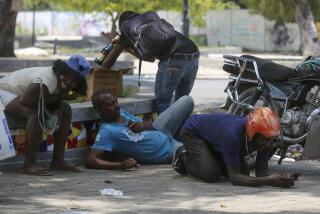World Perspective : Jamaica : Outrage Over High-Profile Killing Is Felt Two Ways : Even as media chide Caribbean nation’s police for not doing enough to reduce crime, watchdog groups say beefed-up patrols have gone too far.
- Share via
KINGSTON, Jamaica — Even amid the bloodshed that has left more than 570 of Jamaica’s 2.6 million islanders dead this year and triggered a controversial police war on crime, Madame Rose Leon’s killing last month has unleashed an enduring wave of shock and outrage--aimed at the nation’s lawbreakers and law enforcers alike.
A month shy of her 90th birthday, the elegant former legislator, Cabinet minister and doyenne of two Jamaican generations was found bound, gagged and choked to death in her Kingston villa Aug. 16. Thieves entered through the roof, cleaned out the seven-bedroom home and fled in Madame Leon’s green Toyota.
An autopsy last week showed she’d suffocated on her own dentures, which had been forced down her throat by the gag. The callousness of the crime against such a prominent figure added to the angst in a Caribbean capital that has been struggling for years with one of the highest murder rates in the world.
The Jamaica Observer newspaper recently concluded that the only good to come of Madame Leon’s murder “is that we have not yet become so subsumed and calloused by the daily killings . . . so as to totally lose our anger at some new outrage.”
But for police officials here, who have come under increasing criticism for overreacting to the public outcry against crime, ironies and frustrations abound. The killing in Kingston’s posh Irish Town neighborhood came at a time when Jamaica’s murder rate has been going down--not up, as most of the population believes.
As of last week, 576 people had been killed so far this year in Jamaica--more than 85% of them in metropolitan Kingston--compared with 608 through the same period of last year and 640 in 1997.
“But in Madame Leon’s case, that one murder is like you’ve had 50,” conceded Assistant Police Commissioner Osbourne Dyer of the Jamaican Police Constabulary. “When you have a murder of a Madame Rose Leon, it gives the impression that crime is increasing--even out of control.”
Yet the Irish Town killing also came just weeks after the police and army launched their ambitious Operation Intrepid, a massive initiative against crime by heavily armed joint police and military patrols in the capital that has been so intense and aggressive it has left many citizens fearing them almost as much as the criminals.
Even as Jamaican commentators continue to chide the police for not doing enough to reduce crime, new watchdog groups are springing up to say officers have gone too far. In fact, the only police statistic that is up this year are civilians killed by police: 125 cases as of last week, compared with 101 during the same period last year.
“We need the soldiers on the street, but it’s a fine balance that must be achieved,” said Msgr. Richard Albert, a New York-born Roman Catholic priest whose church is sponsoring a new watchdog group called Jamaicans for Justice. “The criminals don’t follow any laws, but the police and army must follow the law, or they become as bad as the criminals. And then we have anarchy.”
Senior Police Supt. George Williams and other top anti-crime officials had a different spin: “It’s a no-win situation for us. . . . More public education is all we can use to bridge this gap.”
Williams and top officials also blame the increasing viciousness of local gang crime on Washington’s stepped-up deportation of Jamaican-born criminals who have served their time in U.S. prisons.
But for pediatrician Carolyn Gomes and the other middle-class professionals who organized Jamaicans for Justice, the police themselves are part of the problem they’re trying to solve.
“There’s a complete distrust on the part of the whole citizenry of the police because of the abuses of a few policemen,” she said. “If you treat ordinary citizens as criminals, you cannot expect any cooperation from them. You get trapped in a pattern of responses, and we see breaking that pattern as the only solution.”
More to Read
Sign up for Essential California
The most important California stories and recommendations in your inbox every morning.
You may occasionally receive promotional content from the Los Angeles Times.













